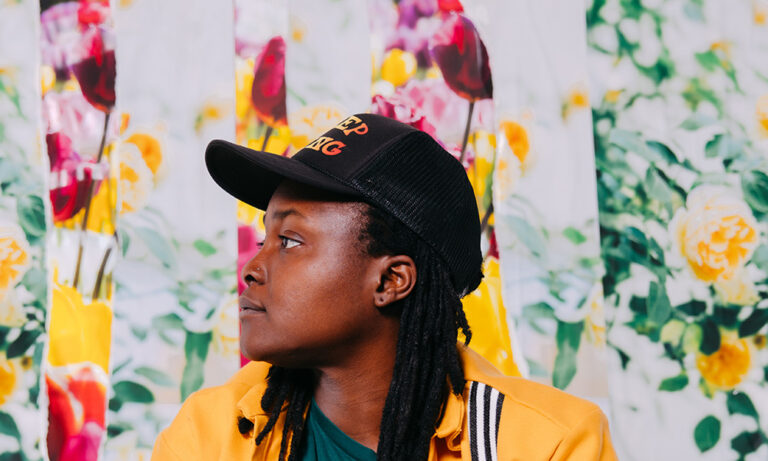
[ad_1]
Joy Oladokun is many things. She’s Black, queer, as nice as they come, a hardcore NBA fan, down-to-Earth and, by her own admission, a “sensitive stoner.” It’s a label she uses to draw attention to the negative stereotypes associated with the cannabis culture and give those who perpetuate such an antiquated way of thinking about weed something positive to consider.
As far as Oladokun is concerned, cannabis is a multipurpose life-enhancing plant. She says she credits the medicinal properties of the herb for aiding in her recovery from the religious trauma of her youth, overcoming anxiety, as well as forging a successful career as an artist. “It’s my way of saying that I smoke a lot of pot and I feel a lot of feelings,” Oladokun tells me from her studio in Nashville. Her latest album Proof Of Life, Oladokun’s second, is all the evidence anyone needs of that. It’s a smooth, emotional amalgamation of R&B and folk that resonates a sense of calm in the storm of American intolerance.
When Oladokun talks about being on the road, she says it’s the unity she has manifested through her music and her ability to bring together fans from all walks of life that she treasures most. “We have found this common ground even though we’re all very different people,” she says. And getting stoned with the artists she shares the stage with—some of them her heroes—isn’t a bad consolation prize. “I try to smoke weed with everybody who’s willing,” Oladokun says. “There’s a band I love called Manchester Orchestra. I smoked a joint with Andy Hull and that was a highlight. Honestly, a lot of people have been on and off the tour bus.”
While cannabis is instrumental in Oladokun’s life, she admits she’s a late bloomer. It wasn’t until after leaving her small religious town and God-fearing family in Arizona to attend Vanderbilt University in Nashville that she says she was exposed to the plant for the first time. “I had just heard so much negativity about drugs in general and there’s some addiction in my family,” Oladokun says. “I think in high school, I didn’t know enough about anything to risk it.” But after pulling a bunch of all-nighters in college and getting a taste of the Music City studio life, somewhere along the way someone passed her a joint.
She accepted it and GASP! Nancy Reagan, Jesus or anyone else for that matter didn’t appear and drag her to hell. Oladokun learned in that moment that weed wasn’t negative. On the contrary, the experience was invigorating, uplifting and a source of new life. “It was the best vocal take I’d ever done, and I slept really well and had a great day at school,” she recalls. It was an awakening, one of those “A-ha” moments suggesting that all the anti-pot rhetoric she had been force-fed in her formative years was, in a moment of clarity, untrue.
Learning that weed could help her function better as a human was a major turning point for Oladokun. She wasn’t about to let the ill-informed, “Just Say No” jibber jabber of her youth prevent her from happiness. “The Hard Way,” a soft croon from the latest album, is undeniably a reflection of this metamorphosis. “Jesus raised me, good weed saved me,” the tune begins. Not only has cannabis been a catharsis for Oladokun, it’s also a game-changer in her approach to songwriting. “I tend to smoke when I get to the studio, I take edibles and have those little syrups and I try to stay dosed throughout my creative time,” she says.
To hear her tell it, cannabis is also deserving of a co-executive producer credit. It’s like her fifth Beatle. “When I’m producing something, I try to take a break when I feel like it’s done and get high and listen back to what I’ve worked on,” she says.
Weed, it would seem, is Oladokun’s not-so-secret crucial creative tool, expanding the depth of her ear and allowing her to process the work from a place unattainable without it. Can I get an Amen?
[ad_2]
Source link
